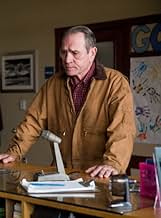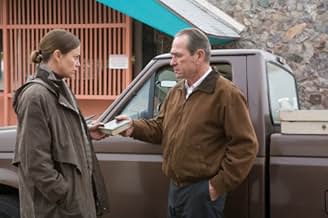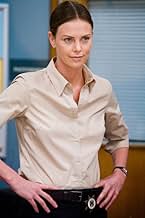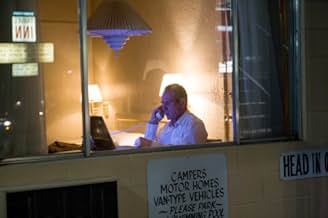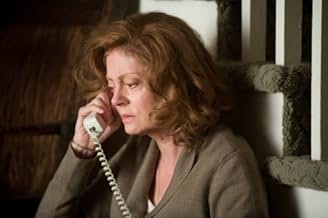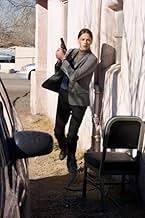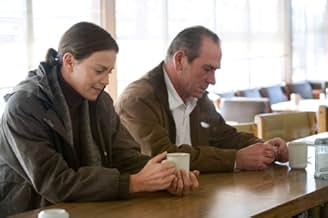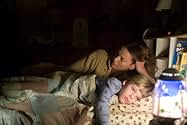NOTE IMDb
7,1/10
76 k
MA NOTE
Un enquêteur militaire à la retraite travaille avec un inspecteur de la police pour découvrir la vérité sur la disparition de son fils après son retour d'une mission en Irak.Un enquêteur militaire à la retraite travaille avec un inspecteur de la police pour découvrir la vérité sur la disparition de son fils après son retour d'une mission en Irak.Un enquêteur militaire à la retraite travaille avec un inspecteur de la police pour découvrir la vérité sur la disparition de son fils après son retour d'une mission en Irak.
- Réalisation
- Scénario
- Casting principal
- Nommé pour 1 Oscar
- 3 victoires et 21 nominations au total
Roman Arabia
- Private Robert Ortiez
- (as Victor Wolf)
Greg Serano
- Detective Manny Nunez
- (as Greg Serrano)
Avis à la une
Released in 2007 and directed & written by Paul Haggis, "In the Valley of Elah" is a crime drama/mystery inspired by the real-life case of Richard T. Davis. The story revolves around an elderly Tennessee couple (Tommy Lee Jones & Susan Sarandon) who get word that their son has gone missing from his base in New Mexico shortly after his return from Iraq. A retired military investigator, Hank Deerfield (Jones) goes to the base to find out the awful truth. Charlize Theron plays the civilian detective near the base who tries to help Hank while Jason Patric plays the Army counterpart. Josh Brolin is on hand as the town police chief.
This is a slow-burn mystery highlighted by great acting by the principles, especially Jones, and a thoroughly realistic story, which isn't surprising seeing as how it's based on true events. Speaking of which, I was surprised to find out that the basic details of the story are all accurate. The actual events took place in the Fort Benning area of Georgia rather than the fictitious Fort Rudd, NM.
The movie's not anti-Iraq War, but rather anti-PTSD; it merely reveals the awful truth about war in general: When we send our young men off to far-off lands where brutal warfare is normal they can bring that desensitized mentality back with them where the barbaric behavior that might be acceptable in war is anything but normal or conducive to a successful life, to say the least. Add the idiocy of alcohol abuse to the mix of PTSD and the results almost certainly WON'T be good.
The title refers to the valley where David, as a teen, fought and defeated the utterly intimidating Goliath from 1 Samuel 17.
ADDITIONAL ACTORS: James Franco, Wes Chatham, Jake McLaughlin, Mehcad Brooks and Roman Arabia play soldiers who knew Deerfield's son while Frances Fisher has a curious cameo (you'll know what I mean).
The film runs 121 minutes and was shot in Whiteville, Tennessee, and Albuquerque, New Mexico, with Morocco substituting for Iraq.
GRADE: B
This is a slow-burn mystery highlighted by great acting by the principles, especially Jones, and a thoroughly realistic story, which isn't surprising seeing as how it's based on true events. Speaking of which, I was surprised to find out that the basic details of the story are all accurate. The actual events took place in the Fort Benning area of Georgia rather than the fictitious Fort Rudd, NM.
The movie's not anti-Iraq War, but rather anti-PTSD; it merely reveals the awful truth about war in general: When we send our young men off to far-off lands where brutal warfare is normal they can bring that desensitized mentality back with them where the barbaric behavior that might be acceptable in war is anything but normal or conducive to a successful life, to say the least. Add the idiocy of alcohol abuse to the mix of PTSD and the results almost certainly WON'T be good.
The title refers to the valley where David, as a teen, fought and defeated the utterly intimidating Goliath from 1 Samuel 17.
ADDITIONAL ACTORS: James Franco, Wes Chatham, Jake McLaughlin, Mehcad Brooks and Roman Arabia play soldiers who knew Deerfield's son while Frances Fisher has a curious cameo (you'll know what I mean).
The film runs 121 minutes and was shot in Whiteville, Tennessee, and Albuquerque, New Mexico, with Morocco substituting for Iraq.
GRADE: B
Only Roger Ebert and the reviewer for Rolling Stone seem to see the truth here: this film is slow and elegiac because it deals with heavy matters, but it is never boring, not if you understand the situation and the depth of feelings being explored. It's as if reviewers don't get it because they didn't really feel what the film is saying. Saying that there have been dozens of films about how war ruins men so it's a cliché, and that this one is too dreary and slow means that a person has stopped feeling for what is really hurtful, is even in denial. And that's the theme of this film: what happens when we lose touch with what's painful and don't care any more. The film is restrained but powerful, which is why it has such a strong effect.
Jones is wonderfully grim, with a face like a road map, as he explores what happened to his son. Charlize Theron is beautiful even though she is playing a woman who is forced to act as non-sexy as possible to get on in her job in a male police force. Susan Sarandon is not, as some critic said, "underused"; she gives a performance that is all the more powerful because it is restrained. This movie should be a must see for all who believe that the Iraq war should continue until there is an honorable time for America to leave. That time is already passed.
Jones is wonderfully grim, with a face like a road map, as he explores what happened to his son. Charlize Theron is beautiful even though she is playing a woman who is forced to act as non-sexy as possible to get on in her job in a male police force. Susan Sarandon is not, as some critic said, "underused"; she gives a performance that is all the more powerful because it is restrained. This movie should be a must see for all who believe that the Iraq war should continue until there is an honorable time for America to leave. That time is already passed.
There are many people out there who hate the way Paul Haggis made his directorial debut, "Crash," an overly soapy and stupidly-tied-together drama (at least, that's what it felt like to them). Those people don't have to worry. His second major directorial outing, "In the Valley of Elah," avoids both of the "mistakes" (although I'd hardly call them that, seeing as he won Best Picture for what he did with "Crash") that he made last time around. Instead of mixing together multiple stories and having them all connect at the very end, this movie revolves around one main story, a story that seems a lot like the modern-day war version of "Chinatown." Instead of going for simple emotional tugs that he did with "Crash," this film focuses on its understated performances, namely from Tommy Lee Jones, who is superb in this film. It is truly courageous of Paul Haggis to be willing to make some serious changes to the style that won him a Best Picture Academy Award, and even more impressive that he pulls it off very well.
The story revolves around an ex-military officer, Hank Deerfield, who is told that his son, a soldier returning home from Iraq, has gone missing. Jones plays the character in such a quiet way that makes you feel like he thinks he shouldn't be showing emotion, but has a lot of it bottled up inside of him. When he arrives at the military station, people don't seem to want to tell him what happened, and say that they expect he'll come to the base anytime soon (this is portrayed especially well by James Franco, who you may know as Harry Osbourne from the "Spider-man" movies).
Refusing to believe that it's as simple as that, Deerfield is relentless in getting information out of people as to what really happened. It's the way he functioned in the army, and it benefits him greatly as he has to get any information he can out of people. Enter Detective Emily Sanders (played by a very strong Charlize Theron), who at first just wants to get through her job for the day, but soon gets wrapped up in also discovering what really happened to Deerfield's son. The two of them have great chemistry together, as their two different personalities give two different perspectives on what's happening.
The movie works because although it does have quite a few negative things to say about the current war in Iraq, the entire film isn't a two-hour tirade against it. It only makes that message part of the story, and does it in subtle ways (aka the soldiers don't just go "War...it...destroys...you..." but take a lot more time expressing their emotion). Much of the story works like a mixture between the great film "Chinatown" and a much better-acted, better-written version of a really good episode of "CSI." Although there may be a few too many twists and lies circling about, it comes to its conclusion very well in a satisfying way for the audience.
Paul Haggis has an uncanny way of bringing out great performances from all of his actors. The performance of Tommy Lee Jones could be the best of his career, he brings out a much more emotionally quiet side in Charlize Theron than we've before seen, the short performance of Susan Sarandon is particularly powerful, and all of the soldiers are played with a feeling of sincerity. The acting is probably the strongest element of the film, and if there's any "weak part," it would have to be the way Haggis forced out some of the plot twists to make the film as long as he wanted it to be.
Regardless of its few problems, "In the Valley of Elah" is both a very well-mannered look at the war in Iraq and its effects on the people involved, as well as a very interesting crime thriller. At the heart of it is Haggis's quietly powerful directing style and the cast's powerfully quiet performances. I don't see this picking up a Best Picture nomination as Haggis's past three Oscar hopeful screenplays ("Letters from Iwo Jima," "Crash," and "Million Dollar Baby"), but I would not be surprised to see it pick up a few acting nominations as well as possibly a screenplay nod. If it does...it would have definitely earned it.
The story revolves around an ex-military officer, Hank Deerfield, who is told that his son, a soldier returning home from Iraq, has gone missing. Jones plays the character in such a quiet way that makes you feel like he thinks he shouldn't be showing emotion, but has a lot of it bottled up inside of him. When he arrives at the military station, people don't seem to want to tell him what happened, and say that they expect he'll come to the base anytime soon (this is portrayed especially well by James Franco, who you may know as Harry Osbourne from the "Spider-man" movies).
Refusing to believe that it's as simple as that, Deerfield is relentless in getting information out of people as to what really happened. It's the way he functioned in the army, and it benefits him greatly as he has to get any information he can out of people. Enter Detective Emily Sanders (played by a very strong Charlize Theron), who at first just wants to get through her job for the day, but soon gets wrapped up in also discovering what really happened to Deerfield's son. The two of them have great chemistry together, as their two different personalities give two different perspectives on what's happening.
The movie works because although it does have quite a few negative things to say about the current war in Iraq, the entire film isn't a two-hour tirade against it. It only makes that message part of the story, and does it in subtle ways (aka the soldiers don't just go "War...it...destroys...you..." but take a lot more time expressing their emotion). Much of the story works like a mixture between the great film "Chinatown" and a much better-acted, better-written version of a really good episode of "CSI." Although there may be a few too many twists and lies circling about, it comes to its conclusion very well in a satisfying way for the audience.
Paul Haggis has an uncanny way of bringing out great performances from all of his actors. The performance of Tommy Lee Jones could be the best of his career, he brings out a much more emotionally quiet side in Charlize Theron than we've before seen, the short performance of Susan Sarandon is particularly powerful, and all of the soldiers are played with a feeling of sincerity. The acting is probably the strongest element of the film, and if there's any "weak part," it would have to be the way Haggis forced out some of the plot twists to make the film as long as he wanted it to be.
Regardless of its few problems, "In the Valley of Elah" is both a very well-mannered look at the war in Iraq and its effects on the people involved, as well as a very interesting crime thriller. At the heart of it is Haggis's quietly powerful directing style and the cast's powerfully quiet performances. I don't see this picking up a Best Picture nomination as Haggis's past three Oscar hopeful screenplays ("Letters from Iwo Jima," "Crash," and "Million Dollar Baby"), but I would not be surprised to see it pick up a few acting nominations as well as possibly a screenplay nod. If it does...it would have definitely earned it.
And with the war still on, the theme of PTSD - Post Traumatic Stress Disorder - is topical and relevant. Shell shock, they used to call it. It is more than shells these days, of course - it is the killing of children and innocents which has an appalling and destabilizing effect on the young U.S. men and women soldiers engaged in Iraq.
Paul Haggis who has made Crash amongst other good films, tackles this difficult subject with sensitivity depicting the dehumanization of the soldiers who come home to an indifferent populace.
Hank Deerfield (played by Tommy Lee Jones) is a retired Vietnam veteran who investigates the disappearance of his son and comes up against the brick wall of military police. A sympathetic detective, Emily Sanders (played by Charlize Theron) slowly takes an interest in the case and negotiates with her superior officer to take the case back from the military police who want to brush it under the rug. When Mike Deerfield is found, dismembered and scattered, Hank commits himself to getting at the truth.
This film is not an anti-war effort but rather the facts are all presented, and one is left to come to one's own conclusions.
Tommy Lee Jones gives one of his best performances here, a relentless, humourless driven father, who has not been the best father, but doesn't rest until he finds the closure he desperately needs on the matter of the murder of his son.
Susan Sarandon was totally underused in the part of the mother of Mike, but the little we are shown of her is riveting.
Charlize Theron plays down her beauty to the degree that she wears bandages and bruises on her face through many of the scenes and ignores the rampant sexism of her unit. A great performance.
I didn't care for the Valley of Elah metaphor which is at the core of the movie itself. The David and Goliath story did not have a relevance to a story of PTSD and the horrific effects it has on both perpetrators and victims. So I am left puzzled at this symbolism. A little guy taking on a giant? Who would be the little guy? The Iraqis?
However, that vexation aside, for overall tension and the sheer watchability of Mr. Jones in a meaty role, this movie gets an 8 out of 10 from me.
.
Paul Haggis who has made Crash amongst other good films, tackles this difficult subject with sensitivity depicting the dehumanization of the soldiers who come home to an indifferent populace.
Hank Deerfield (played by Tommy Lee Jones) is a retired Vietnam veteran who investigates the disappearance of his son and comes up against the brick wall of military police. A sympathetic detective, Emily Sanders (played by Charlize Theron) slowly takes an interest in the case and negotiates with her superior officer to take the case back from the military police who want to brush it under the rug. When Mike Deerfield is found, dismembered and scattered, Hank commits himself to getting at the truth.
This film is not an anti-war effort but rather the facts are all presented, and one is left to come to one's own conclusions.
Tommy Lee Jones gives one of his best performances here, a relentless, humourless driven father, who has not been the best father, but doesn't rest until he finds the closure he desperately needs on the matter of the murder of his son.
Susan Sarandon was totally underused in the part of the mother of Mike, but the little we are shown of her is riveting.
Charlize Theron plays down her beauty to the degree that she wears bandages and bruises on her face through many of the scenes and ignores the rampant sexism of her unit. A great performance.
I didn't care for the Valley of Elah metaphor which is at the core of the movie itself. The David and Goliath story did not have a relevance to a story of PTSD and the horrific effects it has on both perpetrators and victims. So I am left puzzled at this symbolism. A little guy taking on a giant? Who would be the little guy? The Iraqis?
However, that vexation aside, for overall tension and the sheer watchability of Mr. Jones in a meaty role, this movie gets an 8 out of 10 from me.
.
The big movies about the Vietnam war -- Apocalypse Now, Deer Hunter, Full Metal Jacket -- didn't reach the screen until about five years after the war ended. But movies dealing with Iraq and terrorism are cropping up all over even as this war still rages.
What exactly that means is hard to know, but it would seem to indicate that no matter which side of the issue they come down on, the filmmakers are willing to risk alienating about half the potential audience in an America more polarized today than at any point in our history.
"In the Valley of Elah" treads lightly on the politics for most of the movie, concentrating on the unfolding mystery of what happened to a young soldier who vanishes shortly after returning from a tour of duty in Iraq. Looking for answers are his father, a former sergeant in the Army's Criminal Investigation Division, and a young female civilian detective, who gets involved in the case, gets bounced off in a jurisdictional dispute, but winds up back on the case when its determined the crime took place off military property.
While director Paul Haggis gets uniformly good performances out of all the characters, the movie belongs to Tommy Lee Jones as the grieving father and Charlize Theron as the determined detective. Both turn in outstanding performances. Jones shines, playing a man who has spent his life holding in his emotions and can't change now, even as his world falls apart. Theron radiates strength as a woman trying to survive in a sexist police department where all her male colleagues are certain she slept her way into her detective's job. That is somewhat important to the story, because the movie provides a look into the lower class white community that provides the bulk of the recruits in the all volunteer army.
None of this really deals with the politics of the war, though, and it is not until the very end of the film that politics come into play, and even there, it is handled with great care. The message is more about the kind of war America finds itself fighting today and what that type of combat does to the men who engage in it. Unlike world wars one and two, Vietnam and Iraq are not wars between easily recognized enemies. We are not battling the Germans or the Japanese. In both Nam and Iraq, Americans find it is difficult to tell friend from foe. That means they often must make snap decisions that sometimes determine whether they themselves live or die. Needless to say, their decisions also determine the fate of the people in the sights of their weapons..
"In the Valley of Elah" does an excellent job of showing that post traumatic stress syndrome is not an oddity, but rather a growing problem in an army of young men whose job requires them to be quick on the trigger.
Every American should see this movie and then think long and hard about it.
What exactly that means is hard to know, but it would seem to indicate that no matter which side of the issue they come down on, the filmmakers are willing to risk alienating about half the potential audience in an America more polarized today than at any point in our history.
"In the Valley of Elah" treads lightly on the politics for most of the movie, concentrating on the unfolding mystery of what happened to a young soldier who vanishes shortly after returning from a tour of duty in Iraq. Looking for answers are his father, a former sergeant in the Army's Criminal Investigation Division, and a young female civilian detective, who gets involved in the case, gets bounced off in a jurisdictional dispute, but winds up back on the case when its determined the crime took place off military property.
While director Paul Haggis gets uniformly good performances out of all the characters, the movie belongs to Tommy Lee Jones as the grieving father and Charlize Theron as the determined detective. Both turn in outstanding performances. Jones shines, playing a man who has spent his life holding in his emotions and can't change now, even as his world falls apart. Theron radiates strength as a woman trying to survive in a sexist police department where all her male colleagues are certain she slept her way into her detective's job. That is somewhat important to the story, because the movie provides a look into the lower class white community that provides the bulk of the recruits in the all volunteer army.
None of this really deals with the politics of the war, though, and it is not until the very end of the film that politics come into play, and even there, it is handled with great care. The message is more about the kind of war America finds itself fighting today and what that type of combat does to the men who engage in it. Unlike world wars one and two, Vietnam and Iraq are not wars between easily recognized enemies. We are not battling the Germans or the Japanese. In both Nam and Iraq, Americans find it is difficult to tell friend from foe. That means they often must make snap decisions that sometimes determine whether they themselves live or die. Needless to say, their decisions also determine the fate of the people in the sights of their weapons..
"In the Valley of Elah" does an excellent job of showing that post traumatic stress syndrome is not an oddity, but rather a growing problem in an army of young men whose job requires them to be quick on the trigger.
Every American should see this movie and then think long and hard about it.
Le saviez-vous
- AnecdotesThis film was originally a potential starring vehicle for Clint Eastwood, who directed Paul Haggis' screenplay for Million Dollar Baby (2004). Eastwood turned it down, despite liking the script very much, and recommended his friend Tommy Lee Jones for the role of Hank Deerfield.
- GaffesThe opening subtitle says that the Deerfields live in "Munro, Tennessee", but the address on the side of Hank's truck says "Munroe, Tennessee".
- Citations
Chief Buchwald: But didn't you just say that you would do whatever you were told?
Det. Emily Sanders: Yeah, I sometimes exaggerate for effect.
- Bandes originalesShu44le
Written by Robin Davey and Jesse Davey
Performed by The Davey Brothers
Courtesy of The Davey Brothers
Meilleurs choix
Connectez-vous pour évaluer et suivre la liste de favoris afin de recevoir des recommandations personnalisées
- How long is In the Valley of Elah?Alimenté par Alexa
Détails
- Date de sortie
- Pays d’origine
- Sites officiels
- Langue
- Aussi connu sous le nom de
- In the Valley of Elah
- Lieux de tournage
- Sociétés de production
- Voir plus de crédits d'entreprise sur IMDbPro
Box-office
- Budget
- 22 000 000 $US (estimé)
- Montant brut aux États-Unis et au Canada
- 6 777 741 $US
- Week-end de sortie aux États-Unis et au Canada
- 133 557 $US
- 16 sept. 2007
- Montant brut mondial
- 29 541 790 $US
- Durée2 heures 1 minute
- Couleur
- Mixage
- Rapport de forme
- 2.35 : 1
Contribuer à cette page
Suggérer une modification ou ajouter du contenu manquant

Lacune principale
What is the streaming release date of Dans la vallée d'Elah (2007) in Canada?
Répondre






